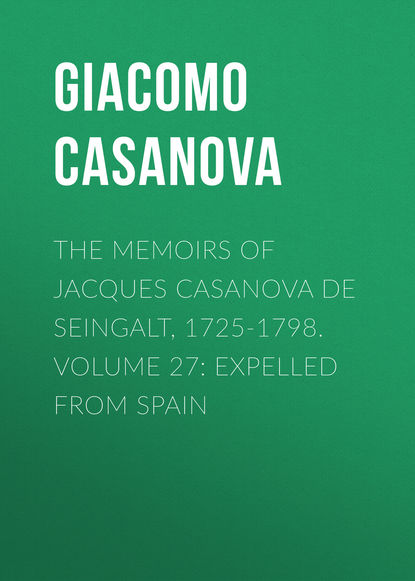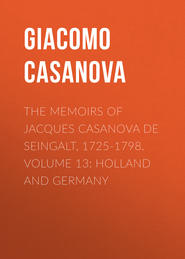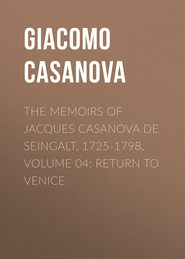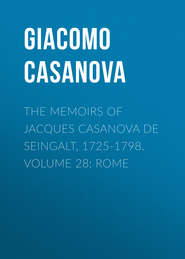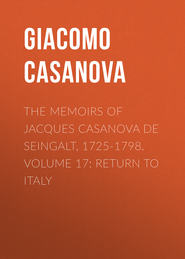По всем вопросам обращайтесь на: info@litportal.ru
(©) 2003-2025.
✖
The Memoirs of Jacques Casanova de Seingalt, 1725-1798. Volume 27: Expelled from Spain
Настройки чтения
Размер шрифта
Высота строк
Поля
I drove to the Abbe Bigliardi, but the lackey, after taking in my name, informed me that his master was out.
I got into my carriage and went to Varnier, who said he wanted to speak to me.
"Come into my carriage," said I, "we will go and hear mass together."
On our way he told me that the Venetian ambassador, Mocenigo, had warned the Duke of Medina Sidonia that I was a dangerous character.
"The duke," he added, "replied that he would cease to know you as soon as he found out the badness of your character himself."
These three shocks, following in such quick succession, cast me into a state of confusion. I said nothing till we heard mass together, but I believe that if I had not then told him the whole story I should have had an apoplectic fit.
Varnier pitied me, and said,—
"Such are the ways of the great when they have abjured all virtue and honesty. Nevertheless, I advise you to keep silence about it, unless you would irritate Manucci still farther."
When I got home I wrote to Manucci begging him to suspend his vengeance, or else I should be obliged to tell the story to all those who insulted me for the ambassador's sake. I sent the letter to M. Soderini, the secretary of the embassy, feeling sure that he would forward it to Manucci.
I dined with my mistress, and took her to the bull fight, where I chanced to find myself in a box adjoining that in which Manucci and the two ambassadors were seated. I made them a bow which they were obliged to return, and did not vouchsafe them another glance for the rest of the spectacle.
The next day the Marquis Grimaldi refused to receive me, and I saw that I should have to abandon all hope. The Duke of Lossada remained my friend on account of his dislike to the ambassador and his unnatural tastes; but he told me that he had been requested not to receive me, and that he did not think I had the slightest chance of obtaining any employment at Court.
I could scarcely believe in such an extremity of vengeance: Manucci was making a parade of the influence he possessed over his wife the ambassador. In his insane desire for revenge he had laid all shame aside.
I was curious to know whether he had forgotten Don Emmanuel de Roda and the Marquis de la Moras; I found both of them had been forewarned against me. There was still the Count of Aranda, and I was just going to see him when a servant of his highness's came and told me that his master wished to see me.
I shuddered, for in my then state of mind I drew the most sinister conclusions from the message.
I found the great man alone, looking perfectly calm. This made me pluck up a heart. He asked me to sit down—a favour he had not hitherto done me, and this further contributed to cheer me.
"What have you been doing to offend your ambassador?" he began.
"My lord, I have done nothing to him directly, but by an inexcusable act of stupidity I have wounded his dear friend Manucci in his tenderest part. With the most innocent intentions I reposed my confidence in a cowardly fellow, who sold it to Manucci for a hundred pistoles. In his irritation, Manucci has stirred up the great man against me: 'hinc illae lacrimae'."
"You have been unwise, but what is done is done. I am sorry for you, because there is an end to all your hopes of advancement. The first thing the king would do would be to make enquiries about you of the ambassador."
"I feel it to my sorrow, my lord, but must I leave Madrid?"
"No. The ambassador did his best to make me send you way, but I told him that I had no power over you so long as you did not infringe the laws."
"'He has calumniated a Venetian subject whom I am bound to protect,' said he.
"'In that case,' I replied, 'you can resort to the ordinary law, and punish him to the best of your ability.'"
"The ambassador finally begged me to order you not to mention the matter to any Venetian subjects at Madrid, and I think you can safely promise me this."
"My lord, I have much pleasure in giving your excellency my word of honour not to do so."
"Very good. Then you can stay at Madrid as long as you please; and, indeed, Mocenigo will be leaving in the course of a week."
From that moment I made up my mind to amuse myself without any thought of obtaining a position in Spain. However, the ties of friendship made me keep up my acquaintance with Varnier, the Duke of Medina Sidonia, and the architect, Sabatini, who always gave me a warm welcome, as did his wife.
Donna Ignazia had more of my company than ever, and congratulated me on my freedom from the cares of business.
After the departure of Mocenigo I thought I would go and see if Querini, his nephew, was equally prejudiced against me. The porter told me that he had received orders not to admit me, and I laughed in the man's face.
Six or seven weeks after Manucci's departure I, too, left Madrid. I did so on compulsion, in spite of my love for Ignazia, for I had no longer hopes of doing anything in Portugal, and my purse was nearly exhausted.
I thought of selling a handsome repeater and a gold snuff-box so as to enable me to go to Marseilles, whence I thought of going to Constantinople and trying my fortune there without turning renegade. Doubtless, I should have found the plan unsuccessful, for I was attaining an age when Fortune flies. I had no reason, however, to complain of Fortune, for she had been lavish in her gifts to me, and I in my turn had always abused them.
In my state of distress the learned Abbe Pinzi introduced me to a Genoese bookseller, named Carrado, a thoroughly honest man, who seemed to have been created that the knavery of most of the Genoese might be pardoned. To him I brought my watch and snuff-box, but the worthy Carrado not only refused to buy them, but would not take them in pledge. He gave me seventeen hundred francs with no other security than my word that I would repay him if I were ever able to do so. Unhappily I have never been able to repay this debt, unless my gratitude be accounted repayment.
As nothing is sweeter than the companionship between a man and the woman he adores, so nothing is bitterer than the separation; the pleasure has vanished away, and only the pain remains.
I spent my last days at Madrid drinking the cup of pleasure which was embittered by the thought of the pain that was to follow. The worthy Diego was sad at the thought of losing me, and could with difficulty refrain from tears.
For some time my man Philippe continued to give me news of Donna Ignazia. She became the bride of a rich shoemaker, though her father was extremely mortified by her making a marriage so much beneath her station.
I had promised the Marquis de las Moras and Colonel Royas that I would come and see them at Saragossa, the capital of Aragon, and I arrived there at the beginning of September. My stay lasted for a fortnight, during which time I was able to examine the manners and customs of the Aragonese, who were not subject to the ordinances of the Marquis of Aranda, as long cloaks and low hats were to be seen at every corner. They looked like dark phantoms more than men, for the cloak covered up at least half the face. Underneath the cloak was carried el Spadino, a sword of enormous length. Persons who wore this costume were treated with great respect, though they were mostly arrant rogues; still they might possibly be powerful noblemen in disguise.
The visitor to Saragossa should see the devotion which is paid to our Lady del Pilar. I have seen processions going along the streets in which wooden statues of gigantic proportions were carried. I was taken to the best assemblies, where the monks swarmed. I was introduced to a lady of monstrous size, who, I was informed, was cousin to the famous Palafox, and I did not feel my bosom swell with pride as was evidently expected. I also made the acquaintance of Canon Pignatelli, a man of Italian origin. He was President of the Inquisition, and every morning he imprisoned the procuress who had furnished him with the girl with whom he had supped and slept. He would wake up in the morning tired out with the pleasures of the night; the girl would be driven away and the procuress imprisoned. He then dressed, confessed, said mass, and after an excellent breakfast with plenty of good wine he would send out for another girl, and this would go on day after day. Nevertheless, he was held in great respect at Saragossa, for he was a monk, a canon, and an Inquisitor.
The bull fights were finer at Saragossa than at Madrid—that is to say, they were deadlier; and the chief interest of this barbarous spectacle lies in the shedding of blood. The Marquis de las Moras and Colonel Royas gave me some excellent dinners. The marquis was one of the pleasantest men I met in Spain; he died very young two years after.
The Church of Nuestra Senora del Pilar is situated on the ramparts of the town, and the Aragonese fondly believe this portion of the town defences to be impregnable.
I had promised Donna Pelliccia to go and see her at Valentia, and on my way I saw the ancient town of Saguntum on a hill at some little distance. There was a priest travelling with me and I told him and the driver (who preferred his mules to all the antiquities in the world) that I should like to go and see the town. How the muleteer and the priest objected to this proposal!
"There are only ruins there, senor."
"That's just what I want to see."
"We shall never get to Valentia to-night."
"Here's a crown; we shall get there to-morrow."
The crown settled everything, and the man exclaimed,
"Valga me Dios, es un hombre de buen!" (So help me God, this is an honest man!) A subject of his Catholic majesty knows no heartier praise than this.
I saw the massive walls still standing and in good condition, and yet they were built during the second Punic War. I saw on two of the gateways inscriptions which to me were meaningless, but which Seguier, the old friend of the Marquis Maffei, could no doubt have deciphered.
The sight of this monument to the courage of an ancient race, who preferred to perish in the flames rather than surrender, excited my awe and admiration. The priest laughed at me, and I am sure he would not have purchased this venerable city of the dead if he could have done so by saying a mass. The very name has perished; instead of Saguntum it is called Murviedro from the Latin 'muri veteres' (old walls); but Time that destroys marble and brass destroys also the very memory of what has been.
"This place," said the priest, "is always called Murviedro."
"It is ridiculous to do so," I replied; "common sense forbids us calling a thing old which was once young enough. That's as if you would tell me that New Castille is really new."
"Well, Old Castille is more ancient than New Castille."





